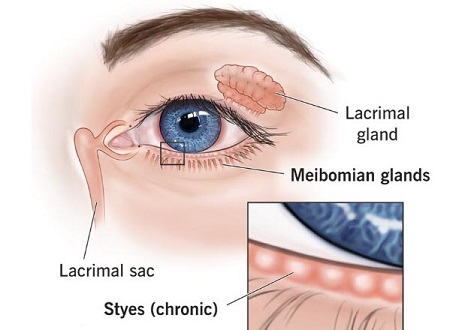Nikhil Prasad Fact checked by:Thailand Medical News Team Jul 26, 2024 8 months, 3 weeks, 5 days, 10 hours, 30 minutes ago
Medical News: In a groundbreaking study, researchers from Xiang’an Hospital of Xiamen University-China and Zhongshan Hospital of Fudan University-China have discovered that SARS-CoV-2, the virus responsible for COVID-19, can infect the Meibomian glands of the eyes. This
Medical News report delves into the significant findings of the study and their potential implications.
 SARS-CoV-2 can infect the Meibomian glands of the eyes
What are the Meibomian glands?
SARS-CoV-2 can infect the Meibomian glands of the eyes
What are the Meibomian glands?
The Meibomian glands are tiny oil glands located along the edge of the eyelids where the eyelashes are found. These glands, numbering approximately 30 to 40 in the upper eyelid and 20 to 30 in the lower eyelid, secrete an oily substance called meibum. This oil is a crucial component of the eye's tears, forming the outer layer of the tear film that prevents tears from evaporating too quickly and keeps them from spilling onto the cheek. By trapping the tears between the oiled edge and the eyeball, the Meibomian glands also ensure that the closed lids are airtight. Various eye problems can affect these glands, highlighting their importance in maintaining eye health.
The Study
COVID-19, caused by the SARS-CoV-2 virus, has affected billions globally, primarily through respiratory symptoms like cough, fever, and lung damage. However, there have been instances of the virus being found in other bodily fluids, including stool, blood, and urine. Notably, SARS-CoV-2 has also been detected in the conjunctivae of COVID-19 patients, hinting that the virus could potentially enter the body through the eyes.
The research team, consisting of Dr Jinghua Bu, Dr Minjie Zhang, Dr Rongrong Zhang, Dr Le Sun, Dr henzong Chen, and Dr Yang Wu, embarked on a study to explore the expression levels of ACE2 (angiotensin-converting enzyme 2) in ocular glands and to investigate the effects of the virus's spike (S) protein on these glands. The team utilized male C57BL/6J mice for their experiments.
Key Findings
The researchers discovered that ACE2 expression levels were highest in the Meibomian glands, followed by the conjunctiva, cornea, and lacrimal glands. This discovery was significant because ACE2 is the cellular receptor that the SARS-CoV-2 virus binds to for entry into cells. The higher the expression of ACE2, the more susceptible the tissue is to infection.
Using co-immunoprecipitation assays, the team confirmed that the S protein of SARS-CoV-2 could directly bind to ACE2 in ocular surface epithelia and Meibomian glands. This binding was accompanied by an upregulation of inflammation-related cytokines and prominent cell apoptosis (cell death) in these tissues.
The Role of Inflammatory Cytokines
The study further explored the induction of inflammatory cytokines by the S protein. In the cornea, IL-1β and TNF-α mRNA levels were elevated after S protein treatment, while the conjunctiva showed an increase in IL-1β and IL-10 mRNA levels. The Meibomian glands exhibited a significant inc
rease in IL-1β, TNF-α, IFN-γ, and IL-10 mRNA levels, indicating a robust inflammatory response.
Immune Cell Infiltration
Immunofluorescent staining revealed that the S protein treatment led to a marked increase in CD45+ cell infiltration in the cornea, conjunctiva, and Meibomian glands. This finding suggests that the S protein induces an immune response, attracting more immune cells to the infected areas.
Cell Apoptosis
The researchers also noted significant cell apoptosis in the corneal and conjunctival epithelial cells and Meibomian gland acinar cells following S protein treatment. This cell death was not observed in the N protein treatment group or the control group, indicating a specific response to the S protein.
Implications of the Study
The study’s findings have profound implications. The high expression of ACE2 in the Meibomian glands suggests that these glands are particularly susceptible to SARS-CoV-2 infection. This susceptibility could potentially explain some of the ocular manifestations observed in COVID-19 patients, such as dry eyes, conjunctivitis and viral-induced meibomitis. The affected immunity in the meibomian glands can also result in opportunistic bacterial infections of the glands.
Furthermore, the study highlights the importance of protecting the eyes from potential exposure to the virus. Health professionals, especially ophthalmologists, should be aware of the risk of ocular transmission and take appropriate precautions.
Conclusion
In conclusion, this study provides valuable insights into the potential for SARS-CoV-2 to infect the ocular glands, particularly the Meibomian glands. The findings underscore the need for further research to fully understand the implications of ocular infection and to develop strategies to protect against it.
The study findings were published in the peer-reviewed journal: Diseases.
https://www.mdpi.com/2079-9721/12/8/169
For the latest on COVID-19, keep on logging to Thailand
Medical News.
Read Also:
https://www.thailandmedical.news/news/covid-19-causes-changes-to-ocular-microbiome-which-can-affect-eye-health
https://www.thailandmedical.news/news/american-doctors-warn-that-covid-19-can-cause-vision-loss
https://www.thailandmedical.news/news/breaking-mild-covid-causes-a-slow-progressing-eye-debilitating-condition-that-most-are-not-even-aware-of-till-it-s-too-late
https://www.thailandmedical.news/news/covid-19-s-hidden-impact-on-eyes-unveiling-rare-retinal-conditions
https://www.thailandmedical.news/news/rising-incidences-of-mewds-amid-covid-19-infections-and-vaccinations
https://www.thailandmedical.news/news/researchers-warn-that-even-mild-covid-19-can-cause-retinal-microvascular-changes-of-the-eyes
